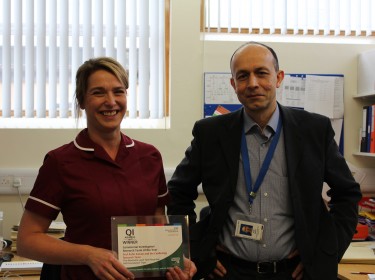Commercial Investigator/ Research Team of the Year 2016
Commercial Investigator/ Research Team of the Year Quality Improvement award for 2016 awarded to Professor Zaman and the Cardiovascular Research Team
At the National Institute for Health Research (NIHR) Cardiovascular Research Networks (North East and North Cumbria) annual meeting – ‘Performing Through Partnership’ Event held recently Professor Zaman and the Cardiovascular Research Team were awarded the Commercial Investigator/ Research Team of the Year Quality Improvement award for 2016.
The team has enjoyed particular success in recruiting to time and target for commercial studies in recent years,
The THEMIS study is looking at the risk of cardiovascular events in patients with Type II Diabetes Mellitus. In order to achieve their recruitment success the team forged strong links with the North East Commissioning Support service. This enabled them to engage with Patient Identification Centers (PIC) sites within Primary care in the region to refer eligible patients for enrolment into the study. The collaboration and communication with primary care was so successful, in fact that all patients identified who showed an interest in participation went on to be successfully randomised into the study. Involving PIC sites in the recruitment strategy for this study has enabled the team to double the number of patients recruited into the study and allowed them not only to reach their agreed target but surpass it. As a result, the team is currently the 4th highest recruiter in the UK for the study, and with recruitment still open they hope to improve on this ranking. The team at NECS, led by Norah Phipps, has been in regular communication with the study coordinator at the Freeman throughout the study set up and delivery to ensure the smooth running of this collaboration and to inform the team at Freeman as to the resources and packs required to let patients know about the study. The team at Freeman has been able to provide regular updates as to how the study is progressing, as well as updating the team at NECS with information regarding from which sites, and when, patients have been recruited.
This collaboration has been invaluable in identifying potential participants and increasing the pool of eligible patients. There has been mutually positive feedback from both the main, and the PIC site, and NECS has commented that the experience of being involved in this study has helped them to develop their research practice and been a very positive example of collaborative working.




